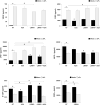Low molecular weight heparin and aspirin exacerbate human endometrial endothelial cell responses to antiphospholipid antibodies
- PMID: 29135051
- PMCID: PMC5728699
- DOI: 10.1111/aji.12785
Low molecular weight heparin and aspirin exacerbate human endometrial endothelial cell responses to antiphospholipid antibodies
Abstract
Problem: Women with antiphospholipid antibodies (aPL) are at risk for pregnancy complications despite treatment with low molecular weight heparin (LMWH) or aspirin (ASA). aPL recognizing beta2 glycoprotein I can target the uterine endothelium, however, little is known about its response to aPL. This study characterized the effect of aPL on human endometrial endothelial cells (HEECs), and the influence of LMWH and ASA.
Method of study: HEECs were exposed to aPL or control IgG, with or without low-dose LMWH and ASA, alone or in combination. Chemokine and angiogenic factor secretion were measured by ELISA. A tube formation assay was used to measure angiogenesis.
Results: aPL increased HEEC secretion of pro-angiogenic VEGF and PlGF; increased anti-angiogenic sFlt-1; inhibited basal secretion of the chemokines MCP-1, G-CSF, and GRO-α; and impaired angiogenesis. LMWH and ASA, alone and in combination, exacerbated the aPL-induced changes in the HEEC angiogenic factor and chemokine profile. There was no reversal of the aPL inhibition of HEEC angiogenesis by either single or combination therapy.
Conclusion: By aPL inhibiting HEEC chemokine secretion and promoting sFlt-1 release, the uterine endothelium may contribute to impaired placentation and vascular transformation. LMWH and ASA may further contribute to endothelium dysfunction in women with obstetric APS.
Keywords: angiogenic; antiphospholipid antibody; chemokine; endothelium; pregnancy.
© 2017 John Wiley & Sons A/S. Published by John Wiley & Sons Ltd.
Figures






References
-
- Miyakis S, Lockshin MD, Atsumi T, Branch DW, Brey RL, Cervera R, Derksen RH, PG DEG, Koike T, Meroni PL, Reber G, Shoenfeld Y, Tincani A, Vlachoyiannopoulos PG, Krilis SA. International consensus statement on an update of the classification criteria for definite antiphospholipid syndrome (APS) J Thromb Haemost. 2006;4:295–306. - PubMed
-
- Andreoli L, Chighizola CB, Banzato A, Pons-Estel GJ, Ramire de Jesus G, Erkan D. Estimated frequency of antiphospholipid antibodies in patients with pregnancy morbidity, stroke, myocardial infarction, and deep vein thrombosis: a critical review of the literature. Arthritis Care Res (Hoboken) 2013;65:1869–1873. - PubMed
-
- Chamley LW, Allen JL, Johnson PM. Synthesis of beta2 glycoprotein 1 by the human placenta. Placenta. 1997;18:403–410. - PubMed
-
- Agostinis C, Biffi S, Garrovo C, Durigutto P, Lorenzon A, Bek A, Bulla R, Grossi C, Borghi MO, Meroni P, Tedesco F. In vivo distribution of beta2 glycoprotein I under various pathophysiologic conditions. Blood. 2011;118:4231–4238. - PubMed
-
- Meroni PL, Raschi E, Grossi C, Pregnolato F, Trespidi L, Acaia B, Borghi MO. Obstetric and vascular APS: same autoantibodies but different diseases? Lupus. 2012;21:708–710. - PubMed
MeSH terms
Substances
Grants and funding
LinkOut - more resources
Full Text Sources
Other Literature Sources
Medical
Research Materials
Miscellaneous

